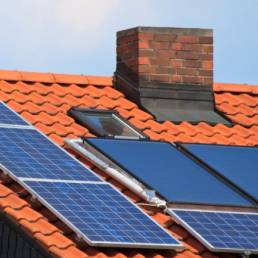MSE News
Solar panel subsidies may fall further, Government says

Solar panel subsidies could be slashed again by next year, the Government has said, after it confirmed the first cut in the feed-in tariff will happen from next month.
The Department for Energy and Climate Change (DECC) today announced plans to halve the tariff, which pays people to generate electricity, for anyone who installs and registers from 3 March 2012.
While this was expected following a legal challenge to its original plans to slash the benefit in December, buried deep in this morning's consultation document lay proposals to almost halve the gain again by April 2013 in three further stages.
After the March cut, the subsidy would be slashed by at least another 20% for those who install from 1 July 2012. Payments would drop again in October 2012 and April 2013, or earlier if too many people install solar.
Those who already have panels keep the rate at the time of registration, which follows the installation.
Energy Minister Ed Davey says: "It is no secret that the uncontrolled surge of solar installations in the latter part of last year, driven by rapidly falling costs, placed a huge strain on the feed-in tariff budget, threatening the Government�s ability to roll out those small scale low carbon technologies in the numbers we wanted over the next few years.
"We acted as swiftly as possible to respond to the threat this posed both to the future of the feed-in tariff scheme, and to the bills of hard-pressed consumers."
How solar panels can pay
Solar panels can save the typical home �90-�180/year in electricity, according to the Energy Saving Trust. But the real draw is the Government guarantee of a feed-in tariff for 25 years.
These gains can be lucrative. Over 25 years, the feed-in tariff scheme could pay back double people's spend if they install before 3 March. For example, a �12,000 system would net �27,500 over 25 years. But from 3 March, typical earnings and savings plummet from �1,190 to �640 a year.
What will I get paid?
- Install before 3 March. Feed-in payments should be 43.3p per kWh (though it may fall to 21p for those who installed from 12 December 2011, if the Government wins an appeal in its bid to revert to the original timetable).
- Install between 3 March and 30 June. Payments will be 21p per kWh.
- Install between 1 July and 31 September. Subject to consultation, but payments may drop to 16.5p-13.6p per kWh.
- Install between 1 October 2012 and 31 March 2013. Subject to consultation, but payments may drop to 15.7p-12.9p.
- Install on 1 April 2013 or later. Subject to consultation, but payments may drop to 14.1p-11.6p.
Can you install by next month?
It is highly unlikely that people will be able to sign up and install before 3 March - you need to install and register with the Microgeneration Certification Scheme (MCS) by then and that's a big ask considering the heavy demand.
Homeowners who have already ordered panels which are still being fitted could still benefit from the original tariff, and should urgently talk over their options with their installer.
Lost appeal
DECC had planned late last year to halve the feed-in tariff for anyone who installed and registered after 12 December 2011, even though the consultation on the plans ran until 23 December.
But last month, the Court of Appeal upheld a ruling that these "retrospective" cuts were unlawful, so the Government proposed the new 3 March cut-off. However, it is still seeking permission to overturn the ruling.
People who install from 1 April will also have to produce an energy performance certificate to qualify for the full payments.
Homes will need to be rated as grade D for energy efficiency or above to qualify, not C as initially proposed. Grade D is easier to achieve, and the Government estimates about half of all properties already qualify.
Comment/Discuss
Discuss this MSE news story: Solar cuts










